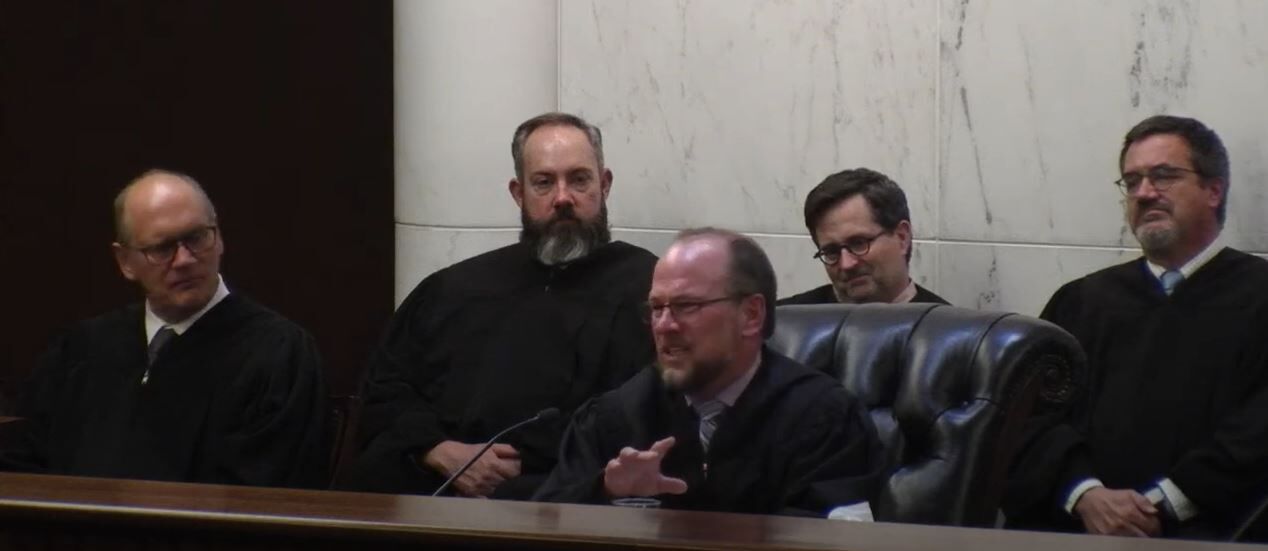Appeals court, 2-1, says judge went too far in authorizing ‘continuous’ monitoring of man’s devices

A Weld County judge mistakenly upheld a requirement that a defendant subject himself to ongoing monitoring of his keystrokes and data, including conversations with his attorneys, as part of his probation, Colorado’s second-highest court ruled on Thursday.
A three-judge panel for the Court of Appeals decided, 2-1, that District Court Judge Vincente G. Vigil neglected to analyze whether “continuous” surveillance of Justin Daniel Silvanic’s electronic devices was the least restrictive method of ensuring Silvanic’s compliance with his sex offender probation. While the panel’s majority did not bar Vigil from reimposing the continuous electronic monitoring if he ultimately deems it necessary, Judge Timothy J. Schutz did not mince words about the invasiveness of the proposed condition.
“The breadth of the monitoring agreement is remarkable,” he wrote in the panel’s Feb. 16 opinion. “Constant, ongoing monitoring may be most administratively convenient to the probation department, but it does not equate to reasonable suspicion.”
Judge Matthew D. Grove disagreed. Silvanic’s probationary terms already allowed his probation officer to search his devices and receive information about Silvanic’s online accounts, Grove pointed out. He believed the online surveillance amounted to an “incremental difference” from the other restrictions.
“Indeed, the court’s decision to lift the outright ban on certain types of internet usage and instead permit monitoring was the less restrictive alternative,” Grove wrote.
Prosecutors charged Silvanic with sexual assault on a child, alleging he repeatedly contacted a friend’s teenage daughter by text message. He eventually persuaded the girl to exchange sexual photos, which culminated in an apparent sexual encounter in the girl’s bedroom.
Silvanic agreed to plead guilty. At his sentencing hearing, he tried to shift the blame to his victim and her parents. While Silvanic’s equivocation concerned Vigil, the judge sentenced him to 10 years on intensive, supervised sex offender probation.
Silvanic challenged some of the probationary conditions, specifically those severely restricting or foreclosing his use of Internet-capable devices. Vigil consented to modify the terms, and the final agreement stipulated that Silvanic’s probation officer or others could search his devices when there were “reasonable grounds.” Also, Silvanic had to turn over his virtual account information and could not delete his online history.
Shortly afterward, in the summer of 2020, Silvanic’s probation officer ordered him to pay for and enroll in an electronic monitoring program. A third party vendor would be allowed to view Silvanic’s messages, call logs, multimedia, keystrokes and “sensitive information, such as passwords and conversations with attorneys.” The information could, in turn, go to Silvanic’s supervision team.
Silvanic objected to the ongoing surveillance, claiming it did not align with his probationary terms and violated his Fourth Amendment right against unreasonable searches. But Vigil upheld the need for continuous monitoring, reasoning that Silvanic was “at a high risk of attempting to cover up and minimize illicit behavior.”
The Court of Appeals panel subsequently examined whether Vigil properly allowed for the monitoring under Colorado law and under the Fourth Amendment. Schutz, in the majority opinion, noted probationers have a “significantly diminished” expectation of privacy, and the legislature has authorized severe restrictions on their activities.
Nonetheless, the Colorado Supreme Court has directed probation terms to be related to a defendant’s rehabilitation, and judges must consider whether less restrictive options are available when constitutional rights are implicated.
Schutz, writing for himself and Judge Dennis A. Graham, concluded the continuous monitoring was not authorized by the original terms of Silvanic’s probation, and appeared instead be a matter of “convenience” for his probation officer.
The agreement “gives the government unfettered access to Silvanic’s private matters – such as his medical portals, his places of worship, data related to any financial support he may provide to political organizations, and the newspapers to which he subscribes and reads online – and severely restricts Silvanic’s ability to communicate with his family and attorney confidentially,” Schutz wrote.
While it was true Silvanic had relied on electronic devices to gain access to his victim, the government could not cite that fact alone to institute continuous online surveillance that would capture significant information about Silvanic.
“Rather, the district court must determine what the legitimate safety concerns are and if there are less intrusive means of monitoring or searching that would adequately address those concerns,” Schutz explained.
The majority did not address Silvanic’s Fourth Amendment concerns, leaving those for Vigil to evaluate going forward.
Grove, writing in dissent, did not believe the keystroke and data monitoring was a bridge too far, considering Silvanic had already agreed to turn over his account information to his probation officer, who could, in turn, view Silvanic’s online activity.
“Under the circumstances here, which involved grooming behavior using internet-related communications technology, a lack of accountability on Silvanic’s part and indications in the presentence report that he had difficulties with impulse control,” Grove argued, “any impingement on Silvanic’s Fourth Amendment rights is substantially outweighed by the government’s interest in ensuring his compliance with the terms and conditions of his probation.”
The case is People v. Silvanic.













